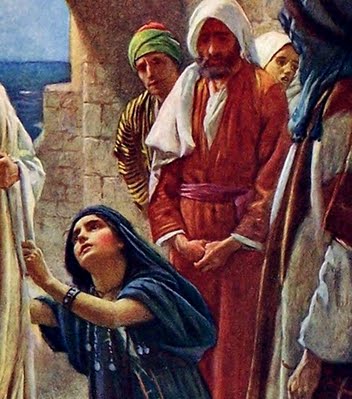Jesus Helps a Non-Jewish Woman – by Ritchie Way
- Bible
- Bible study
- Christian Evidences
- Christian Living
- Christianity
- Faith
- Glory
- Gospel
- Grace
- Holy Spirit
- Jesus
- New Testament
- Prayer
- Ritchie Way
Aug 25, 2015 3732
 Jesus … went to the area around Tyre. When he went into a house, he did not want anyone to know he was there, but he could not stay hidden. A woman whose daughter had an evil spirit in her heard that he was there. So she quickly came to Jesus and fell at his feet. She was Greek, born in Phoenicia, in Syria. She begged Jesus to force the demon out of her daughter. Jesus told the woman, “It is not right to take the children’s bread and give it to the dogs. First let the children eat all they want.”
Jesus … went to the area around Tyre. When he went into a house, he did not want anyone to know he was there, but he could not stay hidden. A woman whose daughter had an evil spirit in her heard that he was there. So she quickly came to Jesus and fell at his feet. She was Greek, born in Phoenicia, in Syria. She begged Jesus to force the demon out of her daughter. Jesus told the woman, “It is not right to take the children’s bread and give it to the dogs. First let the children eat all they want.”
But she answered, “Yes, Lord, but even the dogs under the table can eat the children’s crumbs.” Then Jesus said, “Because of your answer, you may go. The demon has left your daughter.” The woman went home and found her daughter lying in bed; the demon was gone (Mark 7:24-30 NCV).
Jesus took his disciples to Phoenicia, which is now known as Lebanon. It seems he went there for a rest, away from the demanding crowds. “He didn’t want anyone to know he was in Phoenicia,” but his reputation had gone before him and “he could not stay hidden.”
A Greek woman who lived in that region heard that Jesus had come, so she came immediately and fell down at Jesus’ feet imploring him to drive the demon out of her daughter.
This visit of a Gentile created a problem for the disciples and there would have been a noticeable tension in the atmosphere because Jews did not have relationships with non-Jews; they believed that associations with Gentiles made them ritually unclean. Jesus, however, who did not hold such racist views, treated the woman with courtesy. His visit to Phoenicia was a foreshadowing of the Church’s mission to take the good news to the Gentiles. It was still true, however, that before resources could be committed to taking the gospel to the Gentiles, it was essential that the good news be shared with Jerusalem and Judea (Matt. 10:6; Acts 1:8), because to the Jews had been committed the promises.
Jesus tested the woman by telling her that it wasn’t right to take the children’s bread and give it to their dogs. First, the children (of Israel) had to be fed. There was a sign of hope in Jesus’ words for if the children of Israel were to be fed ‘first’ (proton), then the dogs would be fed next. But the woman couldn’t wait; she needed Jesus’ help right away, so she answered, “Quite so, Lord, but the dogs eat what falls from the table. In that case, may I have a crumb?”
The woman’s reply revealed her wit, her faith in Jesus, and her humility, so Jesus willingly granted her requests and healed her daughter.
– Ritchie Way

Ramona Ortega
Feb 6, 2019
Thanks for your thoughtful discerment ofthis word I was able to understand for the first time what this parable means.